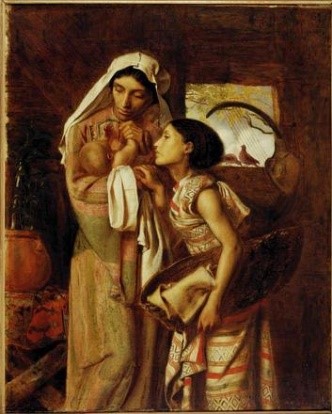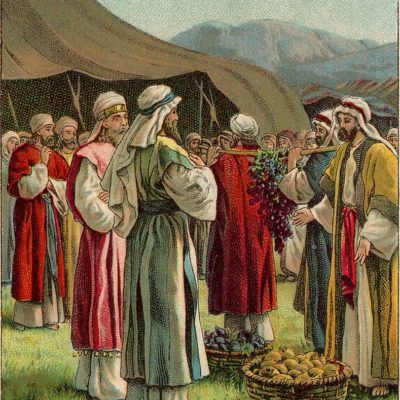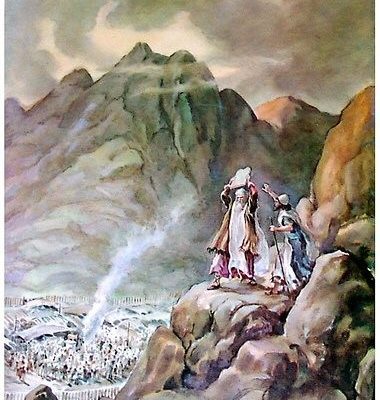Shiphrah and Puah the Hebrew Midwives

Much can be learned from these strong, dedicated, and brave, Hebrew midwives. They had the fear of the LORD which was stronger than the fear of Pharaoh, the king of Egypt. Women of Christ need to have more fear of the LORD and less fear of the Pharaoh’s of this world.
Exodus 1:15 -22
Shiphrah and Puah were midwives in the time of Moses. They ignored the orders given to them by Pharaoh, the king of Egypt. The population of the Children of Israel was increasing, in spite of all their tribulations, the children of Israel continued to multiply. This worried the Pharaoh and he spoke to the Hebrew midwives.
The children of Israel settled in Egypt because of a famine in the land of Canaan. Jacob, who was renamed Israel, had twelve sons. His favorite son was Joseph who was sold into slavery in Egypt by his brothers. Joseph became very powerful after spending two or three years in prison. The LORD God gave Pharaoh two dreams that Joseph interpreted by the leading of the LORD God. This interpretation allowed Egypt to be prepared for a famine that would spread to the tribes of Israel. Pharaoh set Joseph over the land of Egypt and let him appoint officers over the land, and take up the fifth part of the land of Egypt in the seven plenteous years. Joseph gathered all the food of those good years that came up and laid it up in storage for when the famine came. Pharaoh took off his ring of authority and put it on Joseph and arrayed him in fine linen and put a gold chain around his neck. Joseph was thirty years old when he stood side by side before Pharaoh. The family was reunited and stayed in Goshen. Genesis 39:1- 23, Genesis 40: 1- 57
The tribe of Israel multiplied and became numerous every year. They were different than the Egyptians in their heritage, culture and their identity most of all by their religion. This became too much for the Pharaoh who could not understand these people. His biggest fear was that eventually the Egyptians would lose their own identity and he would lose control and power over his people and over his own country. This definitely was a different Pharaoh than the one who had welcomed Joseph and his family with open arms. The solution to the Pharaoh’s problem was to enslave the Israelites.
Pharaoh put them to work and made them do forced labor thinking that if they were working forced labor it would make them too exhausted and discouraged to make babies. This form of birth control failed and the Israelites continued to multiply. Pharaoh took the next step and called the Hebrew midwives to his palace and gave the order to assist in his self-righteous destruction of life for his own gain.
The Pharaoh said “When ye do the office of a midwife to the Hebrew women, and see them upon the stools; if it be a son, then ye shall kill him: but if it be a daughter, then she shall live.” Exodus 1:16. They disregarded the Pharaoh’s order to kill the newborn Hebrew male babies.
Midwives of the time were woman who assists in the delivery of a baby (Exod. 1:15–21). The duties of the midwife likely included cutting the umbilical cord, washing and salting the infant, and wrapping the child in cloths (Ezek. 16:4). The civil disobedience of the Hebrew midwives Siphrah and Puah confounded Pharaoh’s plan to exterminate male Hebrews for a time (Exod. 1:15–21). Their faithfulness was rewarded with families of their own (Exod. 1:21), suggesting that childless women frequently served as midwives. (Brand, 2003).
The two midwives feared the LORD God more than they feared the Pharaoh. They did not do as the king of Egypt commanded and saved the men children alive. The birth rate continued to climb. Pharaoh called the midwives to him a second time and asked them why they had saved the men children alive. The midwives told Pharaoh it was because the Hebrew women are not as the Egyptian women; they are lively, and are delivered before the midwives come unto them. Exodus 1: 18-19.
Don’t you suppose that the Pharaoh used all kinds of strategies to get the midwives to follow his wishes? Things like bribery and threatening their lives if they did not comply with the Pharaoh’s commands. These two Hebrew midwives feared the LORD God more than Pharaoh knowing what he was ordering them to do was morally wrong.
They had the power, strength and the courage to follow their faith and disobeying the Pharaoh himself. They chose to bring forth the life of the male babies no matter if it was a Hebrew or Egyptian woman. They chose the moral assisting of life not the immoral choice of death for the innocent babies in their charge. The LORD God dealt well with the midwives: and the people multiplied, and waxed very mighty. Because the midwives feared the LORD God He made them houses. Pharaoh then charged or ordered all his people, saying, “Every son that is born ye shall cast into the river, and every daughter ye shall save alive.” Exodus 1: 20-22
These two brave Hebrew midwives are powerful examples of standing on the side of the freedom of life for the innocent. They heard the voice of the LORD and obeyed trusting in His promise to keep them safe from the threat of the injustice of death of the innocent babies. Their pillars of strength are examples of love, hope, and most of all faith. We need each other to stand in strength and be example of love, hope and faith when it comes to facing the “Pharaoh’s” of our times. This is not saying to break the law of man or risk our lives on a daily basis. It means we as Women of Christ should follow the example of Shiphrah and Puah and fight against the power based on a discrimination of anyone who is weak or different in our society.
We should allow the examples of Shiphrah and Puah to remain in our hearts and lives not allow the “Pharaoh’s” to control us or limit our efforts to rescue the innocent. Let us make children the priority in our society regardless if they are a boy or a girl. We need to embrace them and teach them in the ways of the LORD. That is our responsibility as follows and Women of Christ.
Reference:
Brand, Chad, Draper, Charles, England, Archie. et al. (2003). Holman Illustrated Bible Dictionary . Nashville, TN: Holman Bible Publishers. 1122-23.
Cite Article Source
MLA Style Citation:
Holstein, Joanne “Shiphrah and Puah the Hebrew Midwives:.” Becker Bible Studies Library Jan 2015.< https://guidedbiblestudies.com/?p=2005,>.
APA Style Citation:
Holstein, Joanne (2015, January) “Shiphrah and Puah the Hebrew Midwives:.” Becker Bible Studies Library. Retrieved from https://guidedbiblestudies.com/?p=2005,.
Chicago Style Citation:
Holstein, Joanne (2015) “Shiphrah and Puah the Hebrew Midwives:.” Becker Bible Studies Library (January), https://guidedbiblestudies.com/?p=2005, (accessed).


